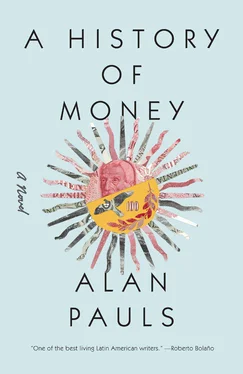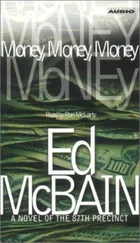Irritation notwithstanding, the urgency poses less of a problem when the bouts of need strike at reasonable hours. They agree on a time and a place, which enables him to reorganize his activities around the rescue mission, and he observes them scrupulously, out of pragmatism more than any sense of responsibility, like doctors who are punctual only in order to save themselves their patients’ reproaches. She thanks him — in her own way, of course, avoiding any explicit display, or rather drowning it in a show of compassion, saying how sorry she is for the inconvenience the emergency must have caused, the commitments he must have had to postpone, et cetera. But very soon, something about the meticulousness with which he carries out these missions — a bureaucratic zeal that’s as efficient and reliable as it is impersonal, being apparently immune to specific circumstance — starts to enrage her, and suddenly becomes the target of her spite. She treats him as she would an irreproachable but insipid employee, giving him double-edged praise and exalting his virtues while making sure he’s aware of the enormous area of requirements he does not satisfy. Seeing him arrive fresh from the shower very early one morning, dressed with the middling elegance that’s perfect for a long day filled with a variety of demands, it occurs to her to suggest, half laughingly, that she pay him: not for the money he gives her (about whose return she never says a single word, though they’re always “loans”) but for bringing it to her. It would be simple: he could just keep a small percentage of each sum he brings. But soon the nocturnal calls intensify, and at ten past three in the morning, when his arms are dead and his eyes full of sleep, and the city is frozen, the good offices of the exemplary messenger aren’t so appealing, and the smile with which he receives and disarms her sarcasm during the day becomes a weary grimace. Nevertheless, he agrees once, having been alarmed by the crisis pitch of her voice and the racket drowning it out — the telephone receiver being dropped, some glass smashing, Verdi playing at crazily fluctuating volumes — and then a second time, and while he makes his midnight journey like a dealer of cash, something dawns on him with absolute certainty, simultaneously scandalizing him and filling him with awe: there aren’t any other sons crossing the city at this hour to take money to their mothers. He promises himself he won’t do it again, and the decision alone is a relief. But he knows how much he’ll miss the bright light that floods his mother’s face when she gets out of the elevator on each of those insane early mornings and comes toward him to open the door, holding herself very upright and smiling, as if she’d regained the only thing whose loss she’d ever truly cried for — much more, even, than her fortune: the radiant beauty of youth.
He offers to send the money by cab from then on. “That’s all I need!” she shouts from the other end of the phone: “Here I am, terrified that the cash will never get here, and you want to give it to a bunch of thieves.” He persuades her: there’s a cab company he trusts, he knows several of the drivers, he’s used them to send things before and never had any problems. The system seems to work. It’s simple, efficient, and, insofar as it’s based on money — the charge account he opens with the cab company — unequivocally professional, a trait for which his mother has always had a particular weakness, partly because it makes the tortuous misunderstandings that come hand in hand with personal relationships impossible. She likes professionals. She trusts their uniforms, their overalls, and their diplomas, and above all the fact that their expertise can be accessed only with money. She’s always won over by loquacious doctors with gray sideburns who write with gold pens, shuffle technical terms like cards, and can check her lymph nodes with their eyes closed, but she doesn’t throw herself at their feet until she receives the signed, sealed bill for their services; when the diagnosis, treatment, and soft parting pat on the shoulder have been reduced to a number, no matter how inflated it is — the higher the better.
Some nights she calls him, asks for the money, and then lowers her voice a little, her timidity just barely shot through with lust, to ask if it would be too much trouble to request the driver who came last time, Walter, Wilson, Wilmar, in any case a Uruguayan with prominent cheekbones and an enormous nose, a relic from the fifties who wears V-necked sweaters, checked shirts buttoned all the way to the top, and freshly shined shoes, who always declines her tips with a vague air of surprise, looking like the last bastion of civilization declining a barbarous old custom, while tilting his head to one side and brushing the brim of his hat with two fingers. A week later, the whole system is endangered. At quarter to four, his mother calls him sounding raw. Where is the driver? He should have been at her house an hour ago. Why didn’t he send him? But he has a crystal-clear memory of ordering the cab. He calls the firm, and a cavernous, cigarette-sanded voice tells him that the delivery — a sealed envelope with the recipient’s name clearly handwritten on it — was handed over at two forty-five on the dot at the agreed address. Incidentally, says the voice, after a long, deep hack that seems to produce a couple of centuries’ worth of mucous sediment, is sir a close relative of the lady who received it? In that case, could he explain to her that the company’s drivers — least of all Wilson, who doesn’t drink and is married with two splendid daughters — are not allowed to drink alcohol with clients in hallways at two forty-five in the morning? He calls his mother. “The money never came,” she says, blowing her nose. “You can think what you like: it’s their word against mine.” She’s indignant but also shivering from the cold, and from total exposure, as though she were calling from a barren land swept clear by a freezing wind.
This scenario is repeated twice. Both times — partly because he can’t bear to hear his mother whimpering down the phone, and partly because every discussion with the man with the cavernous voice ends the same way, abruptly, with a hail of coughs that nearly makes him pass out — he ends up getting out of bed and going to her place to give her the money, the second version of the money he’s already given her. On both arrivals he’s surprised by the metamorphosis that’s taken place in her: she’s glowing, calm, looking as though she’s just stepped out of some sort of miraculous floral bath, and dressed as if she’s going out, and she asks if he’d like to have breakfast with her. But there’s a third time, identical to the earlier ones in every detail, and this time he decides it’s gone too far. After enduring a sprinkling of exclamations from his mother (“I told you, darling! They’re crooks!”), he puts on his coat and goes to the cab firm’s office in a fury, and right before he pushes the door open, he recognizes Wilson-Wilmar-Walter — his hat poking out, narrow turnups on his suit pants, his dress shoes’ leather gleaming like porcelain — polishing his cab’s steering wheel with an orange flannel while the radio spits out a song that’s as gooey as pomade: “Pretty little baby / Vidalitá / Sad baby girl / How little is left / Vidalitá / Of what you once were.” He stops dead. How long has it been since he last shouted at someone? How long since he was so close to another human face? The last things he remembers from the skirmish are an extreme close-up of the button on Walter’s checked shirt hanging loosely from a thread that won’t last long, the soft echo of an old-fashioned cologne, and a small, probably malignant mole in the shape of a club stuck to his prominent nose like a sticker. But what right does he have to stockpile these shreds of reality while the one who’s fainting and bringing his orange flannel to his chest as though in adoration and staring at him with confusion in his eyes while his knees give out is delicate Wilmar, poor Walter, incorruptible Wilson, all three of them innocent, all three victims who as he’s been told a thousand times will take any journey, no matter how dangerous, be it to Barracas, Fuerte Apache, or Lugano, but not to that frazzled diva who comes downstairs with a bottle of Grand Marnier and two glasses to accept the envelopes her son sends her.
Читать дальше












